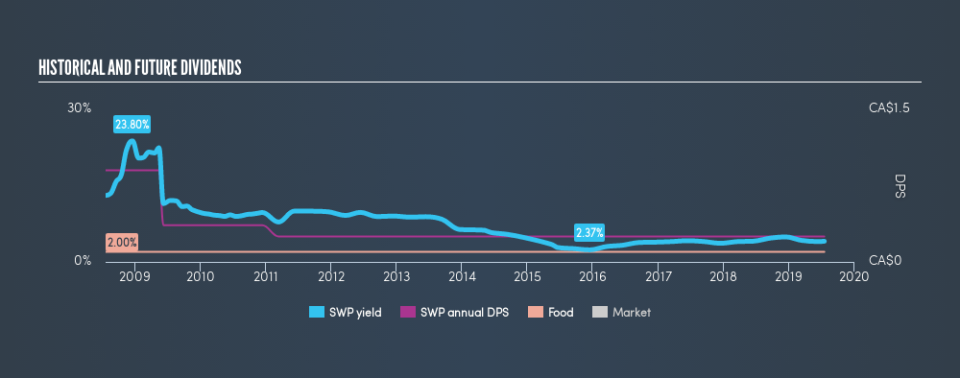Is Swiss Water Decaffeinated Coffee Inc. (TSE:SWP) A Great Dividend Stock?

Want to participate in a short research study? Help shape the future of investing tools and you could win a $250 gift card!
Today we'll take a closer look at Swiss Water Decaffeinated Coffee Inc. (TSE:SWP) from a dividend investor's perspective. Owning a strong business and reinvesting the dividends is widely seen as an attractive way of growing your wealth. Yet sometimes, investors buy a stock for its dividend and lose money because the share price falls by more than they earned in dividend payments.
With Swiss Water Decaffeinated Coffee yielding 4.1% and having paid a dividend for over 10 years, many investors likely find the company quite interesting. It would not be a surprise to discover that many investors buy it for the dividends. There are a few simple ways to reduce the risks of buying Swiss Water Decaffeinated Coffee for its dividend, and we'll go through these below.
Explore this interactive chart for our latest analysis on Swiss Water Decaffeinated Coffee!
Payout ratios
Dividends are usually paid out of company earnings. If a company is paying more than it earns, then the dividend might become unsustainable - hardly an ideal situation. Comparing dividend payments to a company's net profit after tax is a simple way of reality-checking whether a dividend is sustainable. In the last year, Swiss Water Decaffeinated Coffee paid out 56% of its profit as dividends. This is a fairly normal payout ratio among most businesses. It allows a higher dividend to be paid to shareholders, but does limit the capital retained in the business - which could be good or bad.
We also measure dividends paid against a company's levered free cash flow, to see if enough cash was generated to cover the dividend. Last year, Swiss Water Decaffeinated Coffee paid a dividend while reporting negative free cash flow. While there may be an explanation, we think this behaviour is generally not sustainable.
Is Swiss Water Decaffeinated Coffee's Balance Sheet Risky?
As Swiss Water Decaffeinated Coffee has a meaningful amount of debt, we need to check its balance sheet to see if the company might have debt risks. A rough way to check this is with these two simple ratios: a) net debt divided by EBITDA (earnings before interest, tax, depreciation and amortisation), and b) net interest cover. Net debt to EBITDA measures total debt load relative to company earnings (lower = less debt), while net interest cover measures the ability to pay interest on the debt (higher = greater ability to pay interest costs). With net debt of 2.51 times its EBITDA, Swiss Water Decaffeinated Coffee has a noticeable amount of debt, although if business stays steady, this may not be overly concerning.
Net interest cover can be calculated by dividing earnings before interest and tax (EBIT) by the company's net interest expense. Net interest cover of 5.18 times its interest expense appears reasonable for Swiss Water Decaffeinated Coffee, although we're conscious that even high interest cover doesn't make a company bulletproof.
We update our data on Swiss Water Decaffeinated Coffee every 24 hours, so you can always get our latest analysis of its financial health, here.
Dividend Volatility
One of the major risks of relying on dividend income, is the potential for a company to struggle financially and cut its dividend. Not only is your income cut, but the value of your investment declines as well - nasty. Swiss Water Decaffeinated Coffee has been paying dividends for a long time, but for the purpose of this analysis, we only examine the past 10 years of payments. The dividend has been cut by more than 20% on at least one occasion historically. During the past ten-year period, the first annual payment was CA$0.90 in 2009, compared to CA$0.25 last year. Dividend payments have fallen sharply, down 72% over that time.
When a company's per-share dividend falls we question if this reflects poorly on either the business or management. Either way, we find it hard to get excited about a company with a declining dividend.
Dividend Growth Potential
Given that dividend payments have been shrinking like a glacier in a warming world, we need to check if there are some bright spots on the horizon. Strong earnings per share (EPS) growth might encourage our interest in the company despite fluctuating dividends, which is why it's great to see Swiss Water Decaffeinated Coffee has grown its earnings per share at 12% per annum over the past five years. Earnings per share have been growing rapidly, but given that it is paying out more than half of its earnings as dividends, we wonder how Swiss Water Decaffeinated Coffee will keep funding its growth projects in the future.
Conclusion
To summarise, shareholders should always check that Swiss Water Decaffeinated Coffee's dividends are affordable, that its dividend payments are relatively stable, and that it has decent prospects for growing its earnings and dividend. First, we think Swiss Water Decaffeinated Coffee has an acceptable payout ratio, although its dividend was not well covered by cashflow. We were also glad to see it growing earnings, but it was concerning to see the dividend has been cut at least once in the past. In sum, we find it hard to get excited about Swiss Water Decaffeinated Coffee from a dividend perspective. It's not that we think it's a bad business; just that there are other companies that perform better on these criteria.
Now, if you want to look closer, it would be worth checking out our free research on Swiss Water Decaffeinated Coffee management tenure, salary, and performance.
Looking for more high-yielding dividend ideas? Try our curated list of dividend stocks with a yield above 3%.
We aim to bring you long-term focused research analysis driven by fundamental data. Note that our analysis may not factor in the latest price-sensitive company announcements or qualitative material.
If you spot an error that warrants correction, please contact the editor at editorial-team@simplywallst.com. This article by Simply Wall St is general in nature. It does not constitute a recommendation to buy or sell any stock, and does not take account of your objectives, or your financial situation. Simply Wall St has no position in the stocks mentioned. Thank you for reading.

